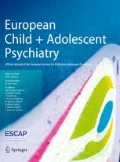Abstract
Long-term effects of two CBTs for adolescents with ADHD are explored: One aimed at improving planning skills (Plan My Life; PML), the other a solution-focused therapy (SFT) without focusing on planning skills. In a RCT, adolescents with ADHD (n = 159) were assigned to PML or SFT and improved significantly between pre- and posttest with large effect sizes Boyer et al (Eur Child Adolesc Psychiatry. doi:10.1007/s00787-014-0661-5), with marginal differences in favor of PML. One-year follow-up data were gathered. Initial improvements remained stable or continued to improve from posttest to 1-year follow-up. 25.9 % of adolescents showed normalized functioning. However, no treatment differences were found. These results are consistent with the finding that treatment of ADHD improves long-term outcomes, but not to the point of normalization. Earlier found differences at 3-month follow-up in favor of PML disappeared, indicating that focusing treatment on planning skills is not necessary for improvement or that a more prolonged planning-focused treatment is needed.

Similar content being viewed by others
Notes
Because some adolescents only use MPH during the school-week, school-week average dose is calculated.
At all assessments data were missing.
References
Boyer BE, Geurts HM, Prins PJM, Van der Oord S (2014) Two novel CBTs for adolescents with ADHD: the value of planning skills. Eur Child Adolesc Psychiatry 24:1075–1090
Abikoff H, Gallagher R, Wells KC et al (2013) Remediating organizational functioning in children with ADHD: immediate and long-term effects from a randomized controlled trial. J Consult Clin Psychol 81:113–128
Evans SW, Owens JS, Bunford N (2013) Evidence-based psychosocial treatments for children and adolescents with attention-deficit/hyperactivity disorder. J Clin Child Adolesc 0:1–25
Kuin M, Boyer BE, Van der Oord S (2013) Zelf Plannen [Plan My Life]. Uitgeverij Lannoo-Campus, Houten
Boyer BE, Kuin M, Van der Oord S (2014) Zelf Oplossingen Bedenken [Solution-Focused Treatment]. Uitgeverij Lannoo-Campus, Houten
Shaw M, Hodgkins P, Caci H et al (2012) A systematic review and analysis of long-term outcomes in attention deficit hyperactivity disorder: effects of treatment and non-treatment. BMC Med. doi:10.1186/1741-7015-10-99
Parker J, Wales G, Chalhoub N et al (2013) The long-term outcomes of interventions for the management of attention-deficit hyperactivity disorder in children and adolescents: a systematic review of randomized controlled trials. Psychol Res Behav Manag 6:87–99
Molina BSG, Hinshaw SP, Swanson JM et al (2009) The MTA at 8 years: prospective follow-up of children treated for combined-type ADHD in a multisite study. J Am Acad Child Adolesc Psychiatry 48:484–500
Safren SA, Sprich S, Mimiaga MJ et al (2010) Cognitive behavioral therapy vs relaxation with educational support for medication-treated adults with ADHD and persistent symptoms: a randomized controlled trial. JAMA 304:875–880
Fabiano GA, Pelham WE, Waschbusch DA et al (2006) A practical measure of impairment: psychometric properties of the impairment rating scale in samples of children with attention deficit hyperactivity disorder and two school-based samples. J Clin Child Adolesc 35:369–385
Cohen J (1988) Statistical power analysis for the behavioral sciences, 2nd edn. Academic Press, New York
Sibley MH, Kuriyan AB, Evans SW et al (2014) Pharmacological and psychosocial treatments for adolescents with ADHD: an updated systematic review of the literature. Clin Psychol Rev. doi:10.1016/j.cpr.2014.02.001
Biederman J, Mick E, Faraone SV (2000) Age-dependent decline of symptoms of attention deficit hyperactivity disorder: impact of remission definition and symptom type. Am J Psychiatry 157:816–818
Acknowledgments
We thank ZonMW for a research grant. We are grateful to the participating students, families and mental healthcare institutions Lucertis Kinder-en Jeugdpsychiatrie, Bosman GGZ, Jeugdriagg, GGZ Noord-Holland Noord, UvA-Minds, Symphora-groep RCKJP and Riagg for their collaboration. We thank Rietta Oberink, for advice on Motivational Interviewing and Marie Deserno, for advice on statistical analyses.
Author information
Authors and Affiliations
Corresponding author
Ethics declarations
Conflict of interest
Bianca E. Boyer is co-developer and author of the manuals ‘Plan My Life’ and ‘Solution Focused Treatment’: she receives royalties for the sales of both interventions. Saskia van der Oord has been a paid consultant for Janssen Pharmaceuticals in the development of a serious game “Healseeker”: aimed at training cognitive functions. Also, she is co-developer and author of the manuals ‘Plan My Life’ and ‘Solution Focused Treatment’. However, she has no financial interest in the sales of the interventions. She has received speaker’s fees from MEDICE and Shire. Other authors declare no conflict of interest.
Additional information
Saskia van der Oord is primarily affiliated to Clinical Psychology, KU Leuven, Tiensestraat 102-bus 3720, 3000 Louvain, Belgium.
Electronic supplementary material
Below is the link to the electronic supplementary material.
Rights and permissions
About this article
Cite this article
Boyer, B.E., Geurts, H.M., Prins, P.J.M. et al. One-year follow-up of two novel CBTs for adolescents with ADHD. Eur Child Adolesc Psychiatry 25, 333–337 (2016). https://doi.org/10.1007/s00787-015-0776-3
Received:
Accepted:
Published:
Issue Date:
DOI: https://doi.org/10.1007/s00787-015-0776-3




